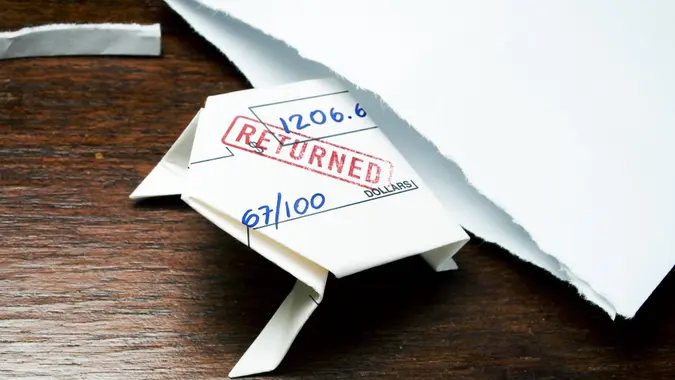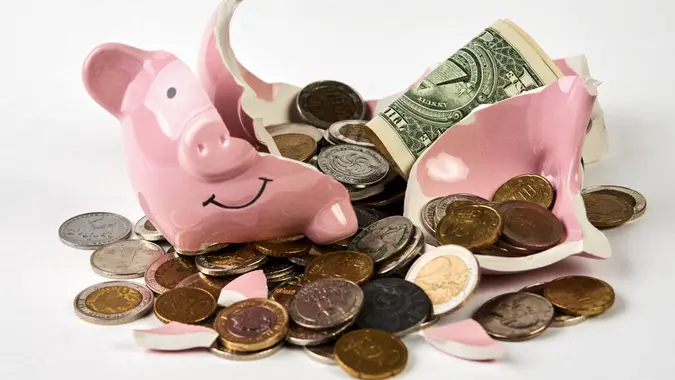What Is Early Warning Services?

Commitment to Our Readers
GOBankingRates' editorial team is committed to bringing you unbiased reviews and information. We use data-driven methodologies to evaluate financial products and services - our reviews and ratings are not influenced by advertisers. You can read more about our editorial guidelines and our products and services review methodology.

20 Years
Helping You Live Richer

Reviewed
by Experts

Trusted by
Millions of Readers
Early Warning Services is a consumer reporting agency, similar to a credit bureau. Instead of providing reports on credit card and loan payments, however, EWS collects and reports information on checking and savings account histories. Read on to find out everything you need to know about this consumer-reporting system.
What Is EWS?
EWS was created jointly by major banks including Chase, Capital One, Bank of America and Wells Fargo to prevent fraud and reduce detection risk. Whereas companies such as ChexSystems and TeleCheck focus on keeping records of people who mismanage bank accounts with overdrafts or writing checks on closed accounts, EWS focuses on fraudulent activity. Its database tracks consumers’ negative interactions with banks, as well as activities such as bank fraud, forgery, check kiting, check alteration and counterfeiting.
Also See: 5 Types of Identity Theft Protection Your Bank Offers
What’s In Your Early Warning Services Report?
Your EWS report includes:
- Your name, address, phone number(s), date of birth and Social Security number
- Savings and checking account information, including bank names, account opening and closing dates, balances, account history and banking activity
- A list of companies that recently requested your EWS report
When you apply for a bank account, banks that use Early Warning Services might deny the application if they find negative information in your EWS records.
Consumer Protection Under the Fair Credit Reporting Act
Similar to the credit bureaus, EWS is subject to the Fair Credit Reporting Act, an important consumer law enforced by the Federal Trade Commission, a government consumer protection agency. The FCRA protects consumer rights by allowing you to review your report and dispute incorrect items.
Order your free copy of your EWS report by downloading an identification form on the EWS website or by contacting the company by phone at 800-325-7775, by fax at 480-656-6850 or by mail at:
Early Warning Services, LLC 16552 North 90th Street, Suite 100 Scottsdale, AZ 85260
Fill out the form, sign it and mail it with a copy of a government-issued ID.
When you receive your report, check it for inaccuracies. Typical errors include incorrect personal information and amounts owed. Your report might even show accounts that you never opened if you’re an unwitting victim of identity theft. If your EWS report doesn’t have much detail, you might need to dig deeper to find out why something led to a denial of opening a new bank account.
How to Dispute an Item on Your EWS Report
If you find any errors, dispute them directly with the bank. File a dispute with EWS, too, following the instructions on the report.
First, gather the following information:
- Your Consumer ID Number from the EWS report
- A complete description of the item you are disputing. For example, include the routing and account numbers for bank accounts with incorrect information.
- A detailed explanation of the dispute, explaining how and why the information is incorrect
- Copies of all supporting evidence and documents
Then, follow these steps to complete the report and file your dispute:
- Provide the previously mentioned information.
- Create and sign a separate dispute sheet for each erroneous item.
- Mail, fax or upload the forms.
If EWS denies your dispute and refuses to remove the contested information, exercise your consumer rights by sending a rebuttal statement to add to your file.
Also See: How to Dispute Credit Report Errors
Second-Chance Banking
If reports from companies such as ChexSystems, TeleCheck and EWS have negative information about you, some banks offer a second-chance bank account. Each bank has its own requirements, such as paying off previous fees and charges. A second-chance checking account often has more restrictions than a standard account. It is still a good way to overcome a bad history, and you might qualify for a regular account within six to 12 months, depending on the bank.
Keep Reading: Best Second-Chance Checking Accounts
Editorial Note: This content is not provided by Chase. Any opinions, analyses, reviews, ratings or recommendations expressed in this article are those of the author alone and have not been reviewed, approved or otherwise endorsed by Chase.
 Written by
Written by 

























